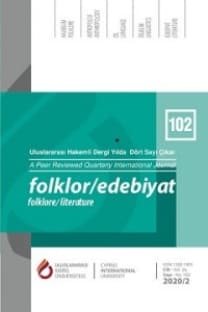Ian McEwan’ın Solar Adlı Romanında Toksik Bilinç
Ian McEwan, Solar, toksik bilinç, iklim değişikliği eko-kurgu
Toxic Consciousness in Ian McEwan’s Solar
Ian McEwan Solar, toxic consciousness, climate change, eco-fiction,
___
- Augé, M. (1997). Non-places: Introduction to an anthropology of supermodernity (Trans. John Howe). London and New York: Verso.
- Bracke, A. (2010). Redrawing the boundaries of ecocritical practice. Interdisciplinary Studies in Literature and Environment, 17(4), 765-768. Retrieved from https://www.jstor.org/
- Brown, M. (2010, March 11). Ian McEwan interview: Warming to the topic of climate change. The Telegraph. Retrieved from https://www.telegraph.co.uk
- Buell, L. (2005). The future of environmental criticism: Environmental criticism and literary imagination. Malden: Blackwell.
- Deitering, C. (1996). The postnatural novel: Toxic consciousness in the fiction of the 1980s. In C. Glotfelty and H. Fromm (Eds.), The ecocriticism reader: Landmarks in literary ecology (pp. 196- 203). Athens: The University of Georgia Press.
- Garrard, G. (2004). Ecocriticism. London and New York: Routledge.
- Garrard, G. (2013). Solar: Apocalypse not. In S. Groes (Ed.), Ian McEwan: Contemporary critical perspectives (pp. 123-136). London and New York: Bloomsbury.
- Garrard, G. (2013). The unbearable lightness of green: Air travel, climate change and literature. Green Letters: Studies in Ecocriticism, 17 (2), 175-188. doi: 10.1080/14688417.2013.800335
- Glotfelty, C. (1996). Introduction: Literary studies in an age of environmental crisis. In C. Glotfelty and H. Fromm (Eds.), The ecocriticism reader: Landmarks in literary ecology (pp. xv-xxxvii). Athens: The University of Georgia Press.
- Habibi, S.J. and Karbalaei, S.S. (2015). Incredulity towards global-warming crisis: Ecocriticism in Ian McEwan’s Solar. The Southeast Asian Journal of English Language Studies, 21(1), 91-102. doi: 10.17576/3L-2015-2101-09
- Hamilton, C. (2010). Requiem for a species: Why we resist the truth about climate change. Crows Nest: Allen & Unwin.
- Kerridge, R. (2006). Environmentalism and ecocriticism. In P. Waugh (Ed.), Literary theory and criticism (pp. 530-543). New York: Oxford University Press.
- Kerridge, R. (2010). The single source. Ecozona, 1(1), 155-161. Retrieved from https://ecozona.eu/ McEwan, I. (2005). A boot room in the frozen north. Retrieved from https://capefarewell.com/ explore/215-a-boot-room-in-the-frozen-north.html
- McEwan, I. (2011). Solar. London: Vintage.
- McKibben, B. (2003). The end of nature: Humanity, climate change and the natural world. London: Random.
- Wagner, V. (2010, April 19). British writer Ian McEwan happy to be grounded in Toronto: Interview with author Ian McEwan. Toronto Star. Retrieved from https://www.thestar.com
- ISSN: 1300-7491
- Başlangıç: 1994
- Yayıncı: -
Safiye Erol’un Romanlarında Yeme-İçme Kültürü ve Alışkanlıkları
Kazak Masallarında Kültürel-Bilişsel Olgu: Yansıtıcı Önem
Talgat NURBEKOV, A.b. A.B. SALKYNBAY
İhsan Oktay Anar’ın Efrâsiyâb’ın Hikâyeleri’nde Mit/Metafizik Gülünçlemesi ve Yabancılaştırma Etkisi
Renan Demirkan’ın Üç Şekerli Demli Çay Romanında Türk ve Alman Kültürü Yansımaları
Antropolog Lloyd A. Fallers’ın 1960’lardaki Türkiye Çalışmaları
Kırgız Anlatılarında Kadının Evriliş Süreci
Mayramgül DIYKANBAY, Reyhan KARKINLI
Kültürel Miras Bağlamında Kırsal Kültürel Kimliğin Korunmasında Halkbilim (Folklor) Müzelerinin Rolü
Rus Dilbilim Ekolünde Söylem ve Metin
Ian McEwan’ın Solar Adlı Romanında Toksik Bilinç
Kültür Turizminin Geleneksel Kıbrıs Türk El Sanatlarının Sürdürülebilirliği Üzerine Bir Araştırma
